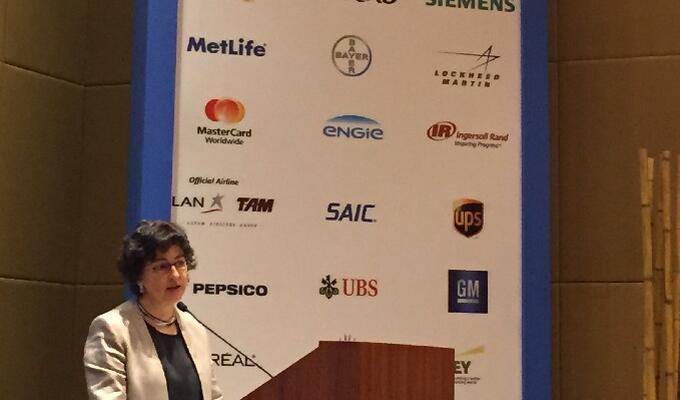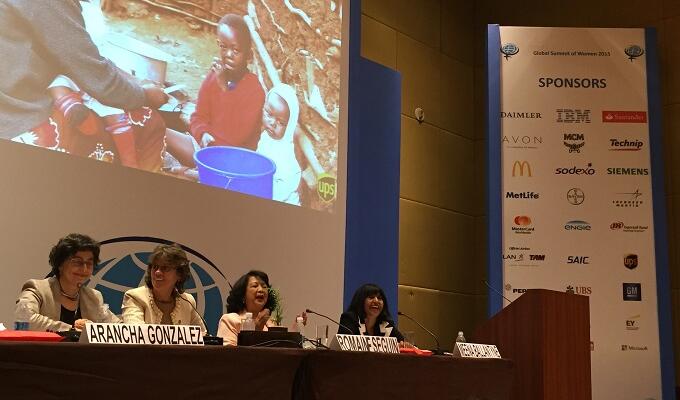

Using public procurement to empower women (en)
Sao Paulo, Brazil
Thursday, May 14th 2015
“Gender equality is more than a goal in itself. It is a precondition for meeting the challenge of reducing poverty, promoting sustainable development and building good governance.”
Kofi Annan
It is a pleasure to be here with you. Many thanks to Irene Natividad for convening us here and for her tireless efforts in favor of women's empowerment.
For those of you unfamiliar with the work of my organisation, let me start with a few words of introduction. The International Trade Centre is a joint agency of the United Nations and the World Trade Organization. Our mandate is to help small and medium-sized enterprises in developing countries thrive in international markets. To do this, we work with policymakers to improve the business environment; with institutions like trade and investment promotion agencies to improve the quality of support they offer to entrepreneurs; and with companies themselves to boost their productivity and competitiveness.
At ITC, we do not view the integration of SMEs into global production and consumption networks as an end in itself. It is simply a means to generating broad-based job creation and sustainable development. This is why we place particular emphasis on expanding economic opportunities for women and young people, for whom economic empowerment yields multi-generational social and developmental dividends.
The potential impact of businesses owned and operated by is immense. In developing countries, women-owned companies represent close to 40% of all micro-, small, and medium-sized enterprises. It is well documented that US1 $ in the hands of a woman means US7$ in healthcare, education and nutrition.
For all of the progress made in recent decades on girls’ education, on maternal health, on women’s political participation, enormous gaps remain in the economic sphere. This is why I believe we should make women's economic empowerment our priority for the next decade.
Not only because it is morally needed. Not only because it is about time. But most importantly because it makes eminent economic sense.
The figures tell a stark tale extending up to the biggest businesses in the world’s most developed countries. Only five of the FTSE 100 leading companies on the UK stock exchange are headed by a woman. In the US, just 23 of the Fortune 500 companies have a woman as chief executive.
The picture is similar for female entrepreneurship. Even though women invented items that we use every day – from disposable diapers and dishwashers to the circular saw – they are not often leaders in the companies that dominate the lucrative trade in consumer goods and hardware.
Women are not shy about starting companies, as we see both in the SME figures from developing countries and in the US, where a third of all firms are female-owned. Yet the bigger companies get, the further the percentage of female ownership drops.
These stubbornly persistent trends are not just bad for society. They are bad for business. In sectors as diverse as agriculture and engineering, a more diverse gender mix is correlated with greater productivity. A Credit Suisse study of 3000 global companies found that companies in which at least 15 per cent of senior management were women generated profits 50% higher than those reported by firms where women made up less than a tenth of the top team.
But we should not lose sight of the bright spots that deserve our attention. Firm level surveys undertaken by ITC in 20 developing countries indicate that when it comes to companies active in foreign markets, women are as likely to own large firms as they are small ones. That’s surprise number one. Surprise number two was the sectors in which women’s participation was the highest: the computer/telecoms/consumer electronics sector was second only to textiles and garments.
So what can we do? I would like to focus on two areas which deserve closer attention.
The first one relates to the role of Government policy for women’s economic empowerment. This is true for underlying conditions such as supportive laws and access to education for girls. But Governments can also support women-owned businesses very directly, through how they purchase goods and services.
Public procurement accounts for over 30% of GDP in developing countries and some 10-15% of GDP in developed countries. This adds up to around 10 trillion dollars per year in direct purchases of goods and services. Only an estimated 1% of this goes to companies owned and operated by women.
Changing the way governments use their buying power has enormous power to reshape the economy. Well-designed procurement systems can support the success of women-owned enterprises, especially SMEs, thus generating substantial social benefits without costing taxpayers significantly more. This is why last year at this same forum I shared with you an initiative we were about to launch to link women to opportunities in the public procurement space.
Since last year this global movement is advancing. It has triggered many questions and it is fair to say that many governments are looking at this avenue with attention. Some governments have just enacted legislation in this regard, like Kenya. Others such as Uganda and Rwanda are exploring it. The Inter- American Development Bank is soon convening an event with Latin American governments to explore options. The African Congress for Women Entrepreneurs have just explored this matter too.
Since last year we have published a guide for policymakers on practical ways to ensure more women entrepreneurs can access public procurement contracts. Solutions proposed range from setting mandatory goals or targets for the share of public procurement that goes to women-owned business, through to preferential treatment, capacity building and measures as simple as publicizing government tenders to women’s business associations. Reducing the size of tenders would also favour women business owners, whose enterprises tend to be smaller. Women-owned businesses have been largely excluded from this market due to many different reasons, including insufficient access to information, understanding of tender procedures and ability to meet requirements.
At ITC, we are developing additional tools to make it easier to empower women through public procurement. An e-learning course for procurement officers will build awareness of the importance of women business enterprises for a healthy economy, and teach them how to set up procedures and targeted assistance that empower women owned businesses.
A procurement map will provide data on some of the estimated 70-100,000 public procurement tenders issued around the world every day, alongside information about preferential procurement legislation in countries that have it. This purpose of this tool is two-fold: to enable women entrepreneurs to identify opportunities to do business with governments, and to show governments new and innovative ways to foster entrepreneurship.
The procurement map is slated for release at ITC’s annual Women Vendors Exhibition and Forum here in Sao Paulo on 2-3 September which are proud to co-host with Brazil's APEX. We hope all of you will be able to attend the forum, which will be a venue for public and private sector leaders to agree on actions to improve the realities faced by businesswomen. It will also host more than a thousand business-to-business meetings between women-owned companies and potential buyers
.
Levelling the playing field on public procurement markets is only half the story. Developing the competitiveness of women business enterprises is the other. The Pacific island nation of Samoa is piloting a country level implementation of our global initiative on public procurement. Our project in Samoa seeks to complement improved public procurement practices with support to women vendors to make them more competitive candidates for government contracts.
Samoa’s Ministry of Finance, which has the mandate for establishing and implementing public procurement policies, has galvanised the participation of public procurement officers across the 13 ministries involved in the project. The Ministry of Finance has also committed to help train women business enterprises in public tender procedures. The project is also working with the National University of Samoa to train and support both government officials and women-owned companies.
Not only can well-constructed procurement legislation offer direct business opportunities to women, it can serve as a powerful example to business.
It is no accident that countries like the United States, which has placed minority sourcing on the federal procurement agenda since the 1960s, also have the most advanced supplier diversity programmes in the private sector.
And this is my second suggestion: the private sector has also a big part to play by ensuring supplier diversity in their value chains. This is what the United Nations Global Compact is about: using supply chains to provide equal opportunities to women to compete for business. Many are doing it, many more should set concrete targets for the next decade.
Let me close by calling on governments and government agencies at all levels, national, regional and local, to join our initiative and commit to measuring and increasing procurement from women vendors. It would be a step towards a more just – and more prosperous - economic future. It would set the tone for the private sector to be an engine in the eradication of poverty which is our collective post 2015 development goal.
Thanks you for your attention.



